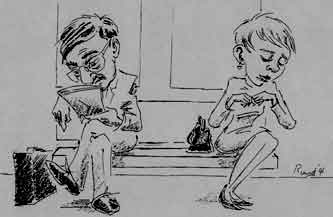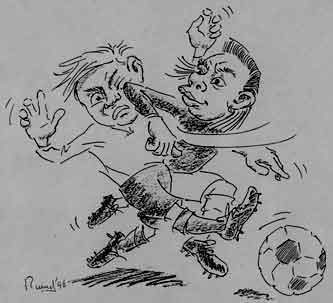


Most people dislike having strangers brush up against them. We like to keep each other at arm's length and try to avoid physical contact. In a crowded elevator you will notice no one makes direct eye contact and if someone does, it causes the other person to feel uncomfortable. Only after the doors of the elevator open would one say 'Hi, Mr. Jones, how are you this morning!' because then the standard arm's length distance in our society, about 90 centimeters, is again restored. When you are in an airplane that is fully booked and a large man sits down next to you, the elbows and even upper-arms or shoulders sometimes touch. While its difficulty to feel comfortable in such a situation, there is no way around it. If your knees touch, the automatic reaction is to pull back in order to avoid more physical contact than necessary.
Similarly, most animals prefer to keep distance. They have their territory in which no others are allowed. Seagulls that are breading on rocky coastlines like to keep a distance of about fifty centimeters from neighboring birds. If another seagull tries to enter that private space to build its nest a vigorous fight will ensue.
Russians living in Moscow however, are comfortable with less 'personal space. People will freely make contact, in busses they might feel the fabric of your coat without hesitation, when it is cold they cling together and even soldiers can be seen walking around hand-in-hand. Physical contact has no negative connotation. The contrary is true in Japan. Japanese people have interesting and complicated ways of avoiding contact and keeping their distance. You can notice this in their grammar and in their greeting rituals.
Perfectionism can be considered identical to keeping distance. Perfectionism includes maintaining an area around you, inspecting what does not belong there, keeping the area neat and having everything in order. Everything is carefully regulated and critically observed. For a perfectionist, these rules not only apply to himself, but he feels, should be respected by others. Naturally, not everyone is a perfectionist, making this an unrealistic expectation.
When we compare Japanese people with Russians, we can conclude that the notion of keeping distance and therefore perfectionism are very different. While Russians seem to accept overcrowded and often unkempt living arrangements, the Japanese, with their obvious sense of distance, are ashamed for any possible defects in their personal affects. They can work on a poem of just some lines for years.
Go on to 'Aiming to please'
| Keeping Quiet | Over compensating | Fighting | To Flee |
 |
 |
 |
 |
| Safety in numbers | Keeping distance | Aiming to please |
 |
 |
 |